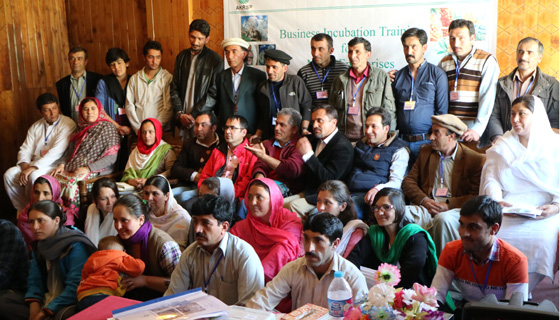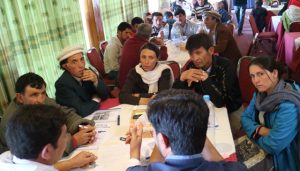This site uses cookies, as explained in our terms of use. If you consent, please close this message and continue to use this site.
The International Centre for Integrated Mountain Development (ICIMOD), in partnership with the Aga Khan Rural Support Programme (AKRSP) is working to promote yak and sea buckthorn value chains in Gilgit-Baltistan, Pakistan. Sea buckthorn berries grow plentifully in the wild in northern Pakistan. The fruit, a source of vitamins, minerals, and Omegas 3, 6 and 9, is valued for its health benefits. It yields a sour, bitter juice, and can be preserved as jam. It can also be processed into a range of marketable supplements and skincare products, providing alternative livelihood options to locals. Similarly, traditional yak herding in Gilgit-Baltistan, where 23% of the area is rangeland, can be strengthened and promoted sustainably. This can create alternative livelihood options for local communities and help improve institutional collaboration with China.
 Group photo of participants of the Business Incubation training for Micro Enterprises
Photo credit: Ghulam Ali/ICIMOD
Group photo of participants of the Business Incubation training for Micro Enterprises
Photo credit: Ghulam Ali/ICIMOD
ICIMOD and AKSRP organized a training to promote these value chains and build the capacities of community members from the region. The workshop, titled Business Incubation Training for Micro Enterprises, was organized from 27 March to 2 April 2017 with the Women Empowerment & Excellency Intiative (WEEI) delivering the training.
The objective was to build the capacities of the participating micro entrepreneurs to tap emerging income opportunities related to yak husbandry, domestic tourism and sea buckthorn to develop alternative livelihoods and enterprises while taking climate change impacts and the decline in traditional agriculture into account.
Altogether 35 micro entrepreneurs, including 12 women, from Himalica pilot sites in Ghizer and Hunza districts participated in the business incubation training, which was different from the usual trainings in that it followed rigorous methodologies, and had content (good practices) tailored to the local contexts and cultures of Gilgit-Baltistan and matching the skills-sets and profiles of the participants. The first of its kind, this training cum incubation followed a model approach, imparting the basic tenets of business and entrepreneurship, coupled with regular coaching and advice by seasoned mentors.

Group sessions facilitated by mentors, Photo credit: Ghulam Ali/ICIMOD
The participants underwent rigorous training on the basic concepts, roles, and qualities of entrepreneurs and on how to plan and manage businesses through role play, games, observations, reflections, and simulations. Later, they used business model canvases (the best available tool at the moment) to develop their main business ideas, plans, and strategies.
Ten locally renowned and seasoned entrepreneurs were roped in to provide mentorship, including counselling, advice, and motivation, to the participants to help them start and grow their enterprises and inculcate a culture of entrepreneurship in Gilgit-Baltistan. The mentors provided support to each participant and guided them while they came up with smart business plans and strategies. They also provided practical action on registration, access to finance, record keeping, and marketing. The mentors will continue to support the participants for the next two to three months until each participant is able to come up with a solid action plan, test their own assumptions about business and come to a mature understanding of the same.
Before this, most of the participants had received vocational training on sea buckthorn processing from the Pakistan Council of Scientific and Industrial Research (PCSIR) Peshawar. Some of them had also received training on cooking local and national cuisines, including a variety of yak meat-based dishes. The imparting of technical and business skills associated with sea buckthorn, and yak value chains linked to tourism, coupled with mentoring services, augurs well for income and livelihood diversification in the region in the context of climate change.
After receiving the six-day training, the participating micro entrepreneurs were confident that they were well-equipped to provide a variety of quality products and services to their customers. They said they can see potential for the yak and sea buckthorn value chains in the region in relation to domestic tourism as well. Local cuisine with yak meat as the main protein and sea buckthorn products could be valuable attractions in the area.
Stay up to date on what’s happening around the HKH with our most recent publications and find out how you can help by subscribing to our mailing list.
Sign Up